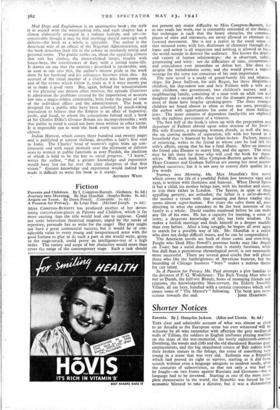Fiction
A Passion for Privacy. By Louis-Paul. (Michael Joseph. 7s. 6d.)
Miss Compron-ButmErr has produced another of her devas- tating conversation-pieces in Parents and Children, which is far more exciting than the title would lead one to suppose. Could not some benevolent theatrical magnate, urged by the needs of repertory, persuade her to write for the stage? Her play might not have a great commercial success; but it would be of con- siderable value to every young and inexperienced actor with the good fortune to play in it; such a part as she would write, given to the stage-struck, could prove an intelligence-test of a high order. The variety and scope of her characters would more than cover the range of the contemporary stage. Such a task should not present any major difficulty to Miss Compton-Burnett, for as one reads her work, one is constantly reminded of the theatre; her technique is such that the hoary obstacles, the common- places of exits and entrances, are never allowed to obstruct the forward movement. She. is not a realist in the usual sense of that misused term; with her, disclosure of character through dia- logue and action is all important and nothing is allowed in from the world outside to distract the audience. She knows the depths and variety of human relationships : she is observant, subtle, penetrating and witty : nor do difficulties of time' circumstance and coincidence ever intimidate or defeat her. She does not despise the melodramatic scene, and she would prove a superb scourge for the actor too conscious of his own importance.
The new novel is a study of grand-family life and relation- ships; Sir Jesse Sullivan, his wife Regan, his three illegitimate children, his dependent son and heir Fulbert with a wife and nine children' two governesses, two children's nurses, and a neighbouring family, consisting of a man with an adult son and daughter and a second wife; these are the dramatis personae, and most of them have lengthy speaking-parts. The three younger children are heard almost as often as they are seen, providing the author with opportunities for some of her most brilliant jests. The inner crannies of dependent family-life are elplored with the ruthless persistence of a virtuoso. The first half of the book is taken up with the preparation and departure of Fulbert abroad upon some mission of Sir Jesse's. His wife Eleanor, a managing woman, dreads, as well she may, the six coming months of -separation left with her brood in a household that is financed by her father-in-law. Fulbert, instead of returning, writes to the friend in whose care he had left his wife's affairs, saying that he has a fatal illness. After an interval the friend asks Eleanor to marry him, and she agrees. The story may be left there for those who will lead the book for them- selves. With each book Miss Compton-Burnett gains in ability; Hope Cranmer and Graham Sullivan are among her most accom- plished successes; but it is not easy to convey their quality in a few words.
Yourney into Morning, Mr. Max Mundlak's first novel which covers the life of a youthful Polish Jew between 19o5 and 1930, is written with freshness and humour. When David Spero is but a child, his mother brings him, with his brother and sister, to join their father in London. The Speros, in spite of their appalling poverty, are orthodox; the father is a ne'er-do-well, the mother a tyrant with that amazing and fierce vitality that seems almost super-human. For years she rules them all, mis- directing in what she considers to be the best interests of the family as a whole. David reaches manhood before he can make any life of his own. He has a capacity for learning, a sense of irony, a desperate knowledge of life. but little wisdom. He makes a foolish marriage and finds himself in a deeper muddle than ever before. After a long struggle he begins all over again to search for a possible way of life. 1\4r. Mundlak is a realist who does not dodge difficult issues, and he can be congratulated.
The American novels are both of them comic and over-long. People who liked Miss Powell's previous books may like Angels on Toast; but a social document that is mainly facetious, while less dull than a pretentious chronological novel, is not necessarily more successful. There are several good cracks that will please those who like the forthrightnesa of American humour, but the bounding of Chicago business " boys " makes a tedious theme for Lny talent.
In A Passion for Privacy Mr. Paul attempts a plot familiar to the devotees of P. G. Wodehouse: The Rich Young Man who is not so Dumb, the half-wit Blonde, hosts of managing friends and relations, the knowledgeable Man-servant, the Elderly Irascible Villain, all are here, handled with a certain coarseness which will annoy some of "The Master's" following. The book gets over-






























 Previous page
Previous page